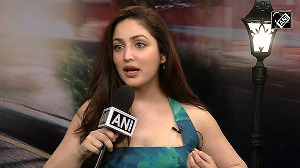Only a small stretch of water separates England from France but the closeness of the two nations ends there. Come Sunday one of sport's biggest rivalries will take centre stage in the Estadio da Luz in Lisbon.
The rugby World Cup semi-final defeat last year and Bryan Robson's goal after 27 seconds in England's 3-1 win at the soccer World Cup of 1982 still irk the French but the two sides' Euro 2004 Group B opener is a chance to reassert Gallic pride.
The talents of Zinedine Zidane and Thierry Henry, to name but two, make France favourites to begin the defence of their European Championship crown with three points.
David Beckham and Michael Owen might fly the St. George's flag and insist England have nothing to fear, but deep down they know their cross-Channel neighbours have the edge.
"We'll show them plenty of respect but we're not in awe of them and we're not scared of them," Owen said. "I think they are the best team in the world at the moment but I am so confident in our players."
But French supremacy has not always been the case in sport, and the world in general.
The commemorations of D-Day last weekend reminded everyone of the sacrifice many British soldiers took in reclaiming France from the Nazis.
In the coming days the French will also await the onslaught from the English tabloid press as they recount stories of Napoleon's defeat to Wellington at Waterloo and King Henry V's victory over Charles VI at Agincourt.
In sport, however, Anglo-French battles are a rarity, given the French do not play cricket and most English have no interest in the Tour de France.
French golfer Jean Van de Velde famously self-destructed at the 1999 British Open after clambering into a water hazard on the 18th, gifting victory to Scotland's Paul Lawrie.
But the balance of power has swung markedly in recent years as France regained its place among the sporting elite.
Sebastien Grosjean's success over Tim Henman at last year's Wimbledon championships was followed this year by the capture of rugby's Six Nations title from world champions England.
MUST-HAVE COMMODITY
The rise of French soccer following the World Cup and European Championship victories in 1998 and 2000 was underlined by the vast numbers of French players now plying their trade in the English premier league.
English pundits who criticised the standard of French domestic soccer then had to eat their words as Monaco beat nouveau riche Chelsea 5-3 on aggregate in this year's Champions League semi-final.
The fact that Henry, Robert Pires, William Gallas, Marcel Desailly, Claude Makelele, Mickael Silvestre and Louis Saha play for Arsenal, Chelsea and Manchester United, the top three sides in the English premier league last season, highlights how French flair has become a must-have commodity.
In turn former England playmakers Glenn Hoddle and Chris Waddle appeared for Monaco and Marseille respectively in the late 1980s where their rare talents were more widely appreciated, but none have followed since.
If William the Conqueror's invasion in 1066 changed British history, the second French invasion has altered English soccer to such a degree that the rivalry between the two sides could be seen as nothing more than club squabbles.
But try telling that to the millions watching on television and the 65,000 inside the Estadio da Luz on Sunday evening.








 © 2025
© 2025